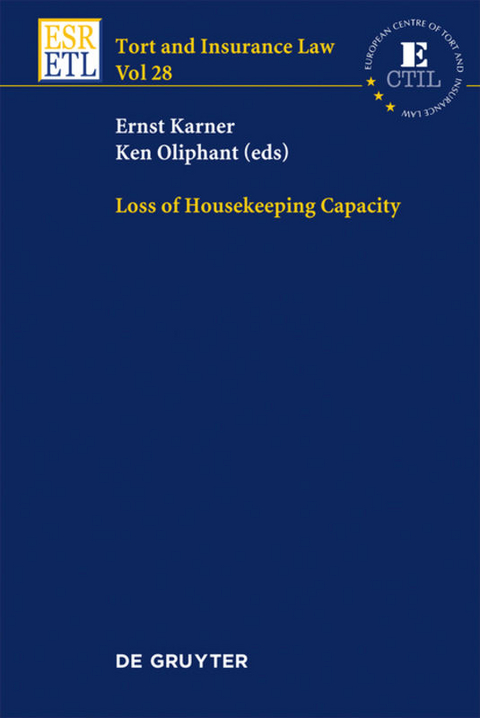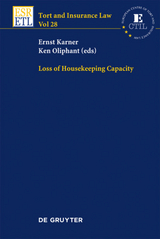Loss of Housekeeping Capacity
Seiten
2012
De Gruyter (Verlag)
978-3-89949-813-4 (ISBN)
De Gruyter (Verlag)
978-3-89949-813-4 (ISBN)
Liability law is rapidly changing in quite a number of countries. This is due to various factors, which are interrelated to a large extent: changing case law and legislation as well as increased and still increasing technical and medical knowledge. As a result, various occupational diseases can, for example, be attributed to working conditions or personal injury to specific products. From the very moment that causation can be proven, the question arises of whether or not liability can be established‑ with far-reaching economic consequences for all parties involved. The rise of phenomena such as mass torts, multiple causation, joint and several liability or various heads of damages (like ecological damage and several diseases and affections) rapidly increases the interest in tort law. In the context of the interrelation between liability and insurance, attention must be paid to the question of whether certain liabilities are still coverable or not, and, if they are, to what amounts. (The question of jurisdictions is of growing importance as is the question of whether a specific liability can be covered by insurance. In this context, one should bear in mind that the affordability of tort law also requires safe and sound insurers. The recent past has shown that there is a limit to their financial stability.)
The topic is of particular interest for insurers as compensation for loss of housekeeping capacity is one of the main heads of damages awarded for personal injury. Naturally it also has considerable importance for accident victims. Yet it has received relatively little scholarly attention, at least from a comparative perspective.The aim of this study is to examine national approaches to the award of damages under the head of loss of housekeeping capacity, and to compare the levels of damages so awarded. The research will therefore address both the concepts employed in different national systems and, by means of practical case studies, the compensation actually paid in individual cases. The results of the research comprise ten country reports (Austria, England and Wales, France, Germany, Italy, The Netherlands, Norway, Poland, Spain and Switzerland) based on a Questionnaire (Part I: General Part and Doctrine, Part II: Concrete Assessment Examples) and a concluding Comparative Report.This project, "Loss of Housekeeping Capacity", was undertaken at the request of the Swiss Insurance Association.
The topic is of particular interest for insurers as compensation for loss of housekeeping capacity is one of the main heads of damages awarded for personal injury. Naturally it also has considerable importance for accident victims. Yet it has received relatively little scholarly attention, at least from a comparative perspective.The aim of this study is to examine national approaches to the award of damages under the head of loss of housekeeping capacity, and to compare the levels of damages so awarded. The research will therefore address both the concepts employed in different national systems and, by means of practical case studies, the compensation actually paid in individual cases. The results of the research comprise ten country reports (Austria, England and Wales, France, Germany, Italy, The Netherlands, Norway, Poland, Spain and Switzerland) based on a Questionnaire (Part I: General Part and Doctrine, Part II: Concrete Assessment Examples) and a concluding Comparative Report.This project, "Loss of Housekeeping Capacity", was undertaken at the request of the Swiss Insurance Association.
Ernst Karner, Institut für Europäisches Schadenersatzrecht, Wien; Ken Oliphant, Institut für Europäisches Schadenersatzrecht, Wien.
| Erscheint lt. Verlag | 16.7.2012 |
|---|---|
| Reihe/Serie | Tort and Insurance Law ; 28 |
| Verlagsort | Berlin/Boston |
| Sprache | englisch |
| Maße | 155 x 230 mm |
| Gewicht | 646 g |
| Themenwelt | Recht / Steuern ► Allgemeines / Lexika |
| Recht / Steuern ► Privatrecht / Bürgerliches Recht ► Besonderes Schuldrecht | |
| Schlagworte | comparative law • Compensation • Compensation; Comparative Law • Europa; Recht • Rechtsvergleichung • Schadensersatz • Schadensersatzrecht • Schadensersatzrecht (SchadensersatzR) • Schadensersatz /Rechtsvergleichung |
| ISBN-10 | 3-89949-813-5 / 3899498135 |
| ISBN-13 | 978-3-89949-813-4 / 9783899498134 |
| Zustand | Neuware |
| Haben Sie eine Frage zum Produkt? |
Mehr entdecken
aus dem Bereich
aus dem Bereich
steueroptimiert übertragen und den Schenker absichern
Buch | Softcover (2023)
C.H.Beck (Verlag)
14,90 €
Vertragliche Schuldverhältnisse
Buch | Softcover (2022)
C.F. Müller (Verlag)
26,00 €
Bürgerliches Gesetzbuch, EuErbVO, ZPO, FamFG, BeurkG, HöfeO, ErbStG, …
Buch | Softcover (2023)
dtv Verlagsgesellschaft
25,90 €




